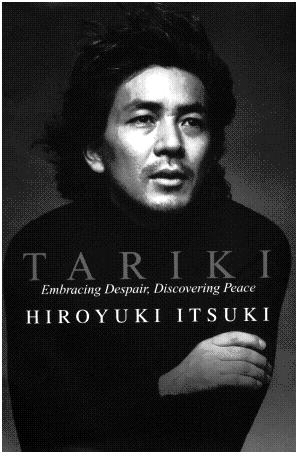Embracing Despair,
Discovering Peace
Hirouki Itsuki
(Kodansha)

One of my friends, who was in a camp in Siberia, related the following story to me. "On winter nights," he said, "why you suddenly felt a horde of fleas attack you, you were happy. That meant the person lying next to you had died and whenever someone died, the two people sleeping on either side had the right to divide up his belongings, his socks and gloves and underwear."
Itsuki or perhaps his translator Joseph Robert is adroit with words, and knows how to snag us in the first few lines of the book:
When I wake up in the middle of the night, I often find myself asking what it was that has kept me going up to now, that has kept me alive. Is there anything that I really believe in?
He then delves into agonies that many of us are familiar with:
health problems; the first signs of old age; all sorts of difficulties with work and relationships, with family or children. Anxiety and restlessness, self-hate and unfocused anger; apathy and anger...
Now the pleasant surprise here, despite the white space and the puffery, is finding out that Itsuki was not writing a cuddly New Age book designed to make us blissful. No --- he emphasizes Buddha's four facts of being: that we have no control over our birth; that we will all fall ill; that we cannot avoid aging; and that we must all face death. He certainly scorns the Norman Vincent Peale positive-think approach which, he says, "is really little more than mindless optimism, a vague feeling of hope." He points out that "it is not something that can be a true source of strength in life."
Itsuki confesses that at least twice, he has contemplated suicide, and, like Jung, claims that suicide "has saved many a life." He sees the pain of our time represented by the child "who has been reared by a television set." The child
is more likely to want to watch what happens, feeling himself a passive spectator, rather than to consider and reflect on the consequences of actions he can barely discern are his own.
In other words, modern day children lose the ability "to imagine what will happen next."
The author asks that we imagine the true way to peace. No --- it isn't quiet meditation, or a daily trip to the altar. Rather, it's failure and personal disaster --- bankruptcy, disease, loss of friends and family, the entire Jobian horror show. Out of that, one creates transformation. What you see as a wall (the nightmare loss of everything) is there to surmount, or go around, or go under.
It is an opportunity for a great teaching that perhaps could have come to you in no other way. You must continue living to understand it.
Itsuki is a facile writer, but we have to confess that we believe that he's on to something. The diversions into Amidi Buddhism and the works of Honen and Shinran can get to be a bit confusing --- but the tone of the book is a delight. "Life is a crock," he is saying: "We'd be fools to think of it any other way." Once we make that discovery, we are on the way to freedom, and the travail that has led us there is not to be gainsaid. It may be saving our lives.
In addition, the author's own personal story is compelling. His Japanese father and mother lived and worked in Pyongyang, Korea. They were slowly building a worthwhile life when they woke up one day to find that with the invasion of the Russians in 1945, all was lost. The effect on Itsuki:
Whenever I remember the time, I instinctively lower my eyes and drop my voice. Although I have written many books, I have written very little about what I saw and experienced then. I doubt I ever will.
That, perhaps, is the greatest sacrifice a professional writer can make. To admit to an experience so scarring that he will never put it into words.